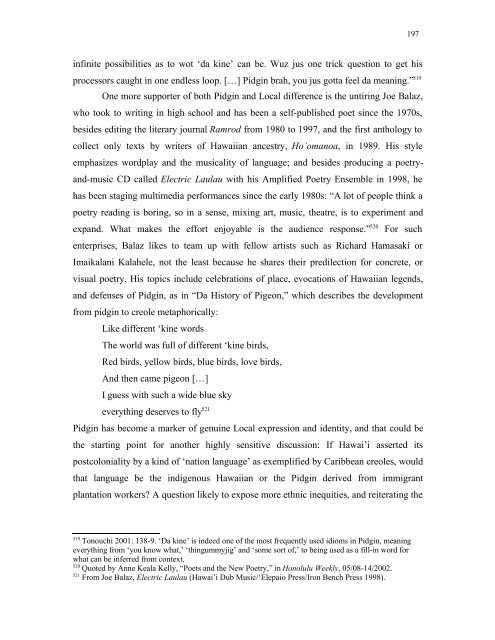A Paradise Lost - KOPS - Universität Konstanz
A Paradise Lost - KOPS - Universität Konstanz
A Paradise Lost - KOPS - Universität Konstanz
You also want an ePaper? Increase the reach of your titles
YUMPU automatically turns print PDFs into web optimized ePapers that Google loves.
infinite possibilities as to wot ‘da kine’ can be. Wuz jus one trick question to get his<br />
processors caught in one endless loop. […] Pidgin brah, you jus gotta feel da meaning.” 519<br />
One more supporter of both Pidgin and Local difference is the untiring Joe Balaz,<br />
who took to writing in high school and has been a self-published poet since the 1970s,<br />
besides editing the literary journal Ramrod from 1980 to 1997, and the first anthology to<br />
collect only texts by writers of Hawaiian ancestry, Ho’omanoa, in 1989. His style<br />
emphasizes wordplay and the musicality of language; and besides producing a poetry-<br />
and-music CD called Electric Laulau with his Amplified Poetry Ensemble in 1998, he<br />
has been staging multimedia performances since the early 1980s: “A lot of people think a<br />
poetry reading is boring, so in a sense, mixing art, music, theatre, is to experiment and<br />
expand. What makes the effort enjoyable is the audience response.” 520 For such<br />
enterprises, Balaz likes to team up with fellow artists such as Richard Hamasaki or<br />
Imaikalani Kalahele, not the least because he shares their predilection for concrete, or<br />
visual poetry. His topics include celebrations of place, evocations of Hawaiian legends,<br />
and defenses of Pidgin, as in “Da History of Pigeon,” which describes the development<br />
from pidgin to creole metaphorically:<br />
Like different ‘kine words<br />
The world was full of different ‘kine birds,<br />
Red birds, yellow birds, blue birds, love birds,<br />
And then came pigeon […]<br />
I guess with such a wide blue sky<br />
everything deserves to fly 521<br />
Pidgin has become a marker of genuine Local expression and identity, and that could be<br />
the starting point for another highly sensitive discussion: If Hawai’i asserted its<br />
postcoloniality by a kind of ‘nation language’ as exemplified by Caribbean creoles, would<br />
that language be the indigenous Hawaiian or the Pidgin derived from immigrant<br />
plantation workers? A question likely to expose more ethnic inequities, and reiterating the<br />
519 Tonouchi 2001: 138-9. ‘Da kine’ is indeed one of the most frequently used idioms in Pidgin, meaning<br />
everything from ‘you know what,’ ‘thingummyjig’ and ‘some sort of,’ to being used as a fill-in word for<br />
what can be inferred from context.<br />
520 Quoted by Anne Keala Kelly, “Poets and the New Poetry,” in Honolulu Weekly, 05/08-14/2002.<br />
521 From Joe Balaz, Electric Laulau (Hawai’i Dub Music/‘Elepaio Press/Iron Bench Press 1998).<br />
197

















